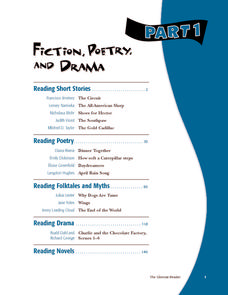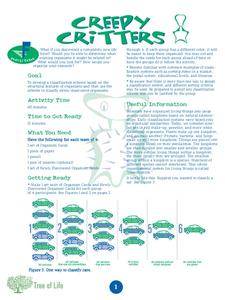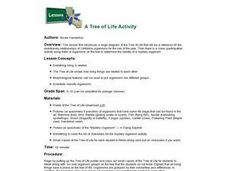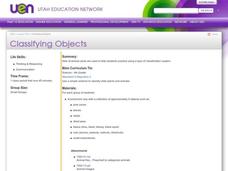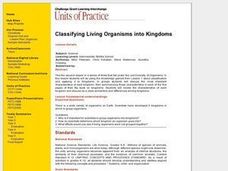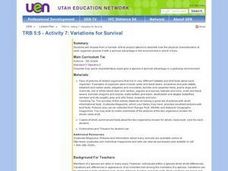Curated OER
Science Jeopardy
Wow! Review an entire semester of biology curriculum playing this Science Jeopardy game! The variety of topics is extremely broad, so you will need to review each question to find if they all apply to your course. As you find material...
Curated OER
Fiction, Poetry, and Drama Part 1
Similar to a textbook, this resource includes multiple texts, plenty of explanation, lots of practice, and several graphic organizers. Use all of the materials, or pick and choose from such texts as "The Circuit," "Shoes for Hector,"...
Centre for Innovation in Mamatics Teaching
Area, Perimeter and Volume
Develop young mathematicians' knowledge of two- and three-dimensional shapes with this geometry workbook. From learning about the classifications of different shapes and figures to calculating their area, perimeter, and volume, this...
Biology Junction
Arthropods
Even the creepy crawlers have pretty amazing anatomy! A thorough lesson describes characteristics of arthropods with an emphasis on their structures. Beginning with a review of the taxonomy hierarchy, the lesson explains the different...
Curated OER
Creepy Critters
Learners classify imaginary newly discovered organisms. In this classification lesson, students are given cards showing imaginary organisms that have been recently discovered. They must classify the organisms based on their characteristics.
Curated OER
Diversity of Life
Students compare the different classifications and explore how organisms are grouped. In this classification lesson students study images of organisms and answer questions.
Curated OER
Species Diversity and Phylogeny
Students explore the classification system of organisms: taxonomy. They examine prepared slides of Protozoans and record information on a Taxonomy Recording Sheet. Two additional classifying activities are also included in this lesson.
Curated OER
Creepy Critters
Pupils develop a classification scheme based on the structural features of organisms. In this organism instructional activity students divide into teams and complete a fun activity.
Curated OER
A Tree of Life Activity
High schoolers solve a mystery of the identification of a unknown organism by comparing its morphological characteristics to those in a tree of life classification poster. They compare the observable characteristics of the specimen and...
Curated OER
Classifying Objects
Fourth graders work in small groups to sort and classify a variety of objects. They develop criteria for sorting and explain the characteristics they chose for classification. Groups record and share their classifications.
Curated OER
Classifying Living Organisms into Kingdoms
Learners create a flip book that describes the basic characteristics of the five main animal kingdoms. They research the animal kingdoms, include examples of organisms for each kingdom and illustrate the finished text.
Curated OER
Classify That!
Students explore diverse forms of life by using modern biological classification systems to group animals that are related. Students then study basic scientific groupings like genus, species, mammals, fish, birds, amphibians, and...
Curated OER
Seeds and Trees Lesson Plan
Students investigate various tree leaves and use a dichotomous key to classify the leaves. In this leaf classification lesson, students study various types of leaves and their Genus. Students record observations for each Genus.
Curated OER
Classifying "Pastanimals"
Students explore biology by creating a poster presentation. In this animal classification lesson, students utilize a SMART board and practice organizing a group of animal shapes by placing them with similar animal families. Students...
Curated OER
An Automobile Phylogenetic Tree
Students construct a phylogenetic tree for various automobiles and trucks after considering important characteristics of these "organisms". They work in small groups to construct the trees and complete a set of questions then they...
Curated OER
Classifying Life
In this classifying life worksheet, students review the 5 kingdoms of organisms by completing 10 matching and 7 fill in the blank questions.
Curated OER
Do You Have the Key?
Students practice using a dichotomous key. In this classification lesson, students read an article about scientific exploration and identification of new species. They use a dichotomous key to identify objects and create their own key.
Curated OER
Science – How Living Things are Grouped
In this classification of living things worksheet, learners respond to 7 short answer, 10 true or false, 4 multiple choice, and 4 graphic organizer questions regarding how living things are grouped.
Curated OER
Biology Trivia
In this biology trivia worksheet, students write short answers to 101 questions about animal classification, human anatomy, animal facts, and attributes of organisms.
Curated OER
Classifying Living Things
In this classification worksheet, students read a description of how all living things are related and describe a diagram showing how this taxonomy works. Students answer five questions related to their reading.
Curated OER
Climate Types
In this weather instructional activity, students identify the type of vegetation found in particular regions across the United States. Then they list the six groups of climates in the Köppen Classification System. Students also describe...
Curated OER
Organizing Life
For this classification worksheet, learners will review vocabulary words associated with the organization of living things which includes kingdom, phylum, class, order, family, genus, and species. This worksheet has 5 fill in the blank...
Curated OER
Variations for Survival
Fifth graders examine two related organisms that live in different environments and compare how the physical characteristics of each organism provided it with survival advantages unique to its own environment.
Curated OER
Animal Classification
In this animal classification worksheet, students will write in 5 examples of vertebrate animals and 6 examples of invertebrates. This worksheet is a graphic organizer.



